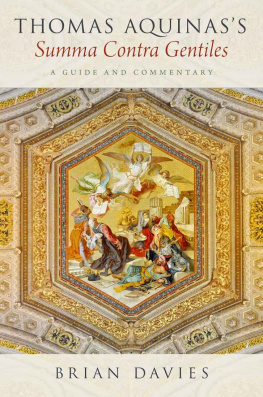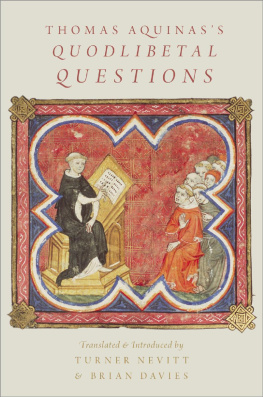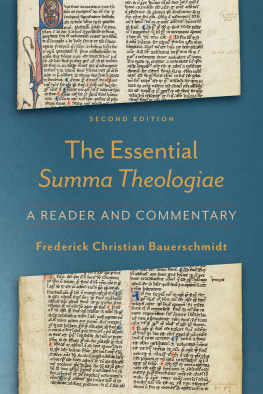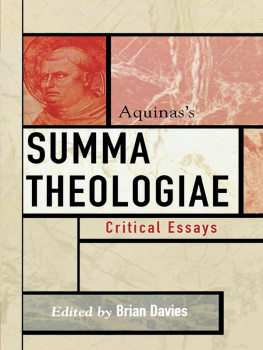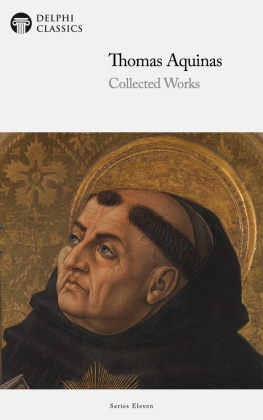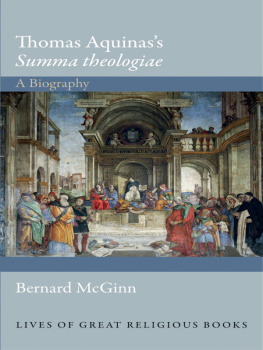Thomas Aquinass Summa Contra Gentiles
A Guide and Commentary

Brian Davies


Oxford University Press is a department of the University of Oxford. It furthers the Universitys objective of excellence in research, scholarship, and education by publishing worldwide. Oxford is a registered trade mark of Oxford University Press in the UK and in certain other countries.
Published in the United States of America by Oxford University Press 198 Madison Avenue, New York, NY 10016, United States of America
Oxford University Press 2016
All rights reserved. No part of this publication may be reproduced, stored in a retrieval system, or transmitted, in any form or by any means, without the prior permission in writing of Oxford University Press, or as expressly permitted by law, by license, or under terms agreed with the appropriate reproduction rights organization. Inquiries concerning reproduction outside the scope of the above should be sent to the Rights Department, Oxford University Press, at the address above.
You must not circulate this work in any other form and you must impose this same condition on any acquirer.
Library of Congress Cataloging-in-Publication Data
Names: Davies, Brian, 1952
Title: Thomas Aquinass Summa contra gentiles: a guide and commentary / Brian Davies.
Description: New York, NY : Oxford University Press, 2016. | Includes bibliographical references and index.
Identifiers: LCCN 2015044427| ISBN 9780190456542 (pbk. : alk. paper) | ISBN 9780190456535 (cloth : alk. paper)
ebook ISBN 9780190456566
Subjects: LCSH: Thomas, Aquinas, Saint, 1225?1274.
Summa contra gentiles. | Thomas, Aquinas, Saint, 1225?1274. | ApologeticsEarly works to 1800.
Classification: LCC BX1749.T45 D38 2016 | DDC 239dc23 LC record available at http://lccn.loc.gov/2015044427
1 3 5 7 9 8 6 4 2
Printed by Sheridan, USA
For Christopher Arroyo and Paul Kucharskionce again.
Contents
Thomas Aquinass summa Contra Gentiles stands out among his many writings. It is not a report of a disputed question over which he presided; nor is it a commentary on a text. It is not a short treatise on a single topic; and it does not range over Christian beliefs in the manner of the more famous Summa Theologiae. Its main conclusions cohere with what we find in Aquinass commentary on the Sentences of Peter Lombard (11001160) and with much that he argues for in his Summa Theologiae. However, even a glance at these two works will leave readers recognizing that the Summa Contra Gentiles is seriously different from either of them. It does not come with questions and articles. Indeed, it resembles a contemporary book since it consists of chapters and flows along in a way that the Sentences commentary and the Summa Theologiae do not. And it reads as produced by someone keen to argue for a number of theses while ignoring certain medieval conventions for discussing them. It comes across as a text in which Aquinas is trying to explain his views on what people can know about God and divine revelation. You might even say that it comes across as a work in which he contributes to philosophy of religion and theology in ways that contemporary philosophers and theologians can appreciate.
In this book I present an overview of the Summa Contra Gentiles for students and teachers of theology and philosophy, and anyone with an interest in Aquinas. This volume can therefore be regarded as a sequel to my Thomas Aquinass Summa Theologiae: A Guide and Commentary (Oxford: Oxford University Press, 2014). Like that book, this one aims to be introductory, if also comprehensive, and it does not presume that its reader is already familiar with medieval thinking.
I begin by trying to situate the Summa Contra Gentiles historically; so I present a brief account of Aquinass life and writings. I also consider the questions When did he draft the Summa Contra Gentiles? Why did he do so? and What kind of work is it? I then move systematically through its four books while following their arguments in detail. In doing so, my primary aim is expository. I strive chiefly to explain what Aquinas is saying. But I also spend a lot of time commenting on what he has to say.
The Summa Contra Gentiles has been far less studied and written about than the Summa Theologiae. But it is a remarkable work, and it provides us with access to Aquinass mind on certain topics in a way that the Summa Theologiae does not. That is largely because it discusses the question What can people deduce philosophically concerning God? in more detail than does the Summa Theologiae. I might add that, as is not the case with the Summa Theologiae, a considerable amount of the Summa Contra Gentiles comes to us in Aquinass own handwriting and with signs of much editing by him. It is a work that we know him to have significantly brooded on and revised before letting go.
I am assuming that most readers of this book will need to rely on translations of Aquinass writings. The best available English edition of the Summa Contra Gentiles is the five-volume one published by the University of Notre Dame Press in 1975.
In what follows I abbreviate Summa Contra Gentiles as SCG. Translations from the Bible come from the New Revised Standard Version. I should add that I have tried to avoid gender-specific reference to God. In some instances, however, I have used he/his simply to avoid awkwardness in wording. Aquinas himself did not have to strive to write with an eye on inclusive language since Latin is inclusive in a way English is not.
For advice on earlier versions of what follows, or on parts of it, I am, with the usual disclaimer, much indebted to Christopher Arroyo, James Claffey, Samuel Kampa, David Kovacs, Paul Kucharski, Turner Nevitt, Michael Torre, and Zita Toth, who created the appendix. For her work as in-house editor, I am also grateful to Cynthia Read at Oxford University Press. I am also grateful to Gwen Colvin of Oxford University Press.
Thomas Aquinass Summa Contra Gentiles
It is possible to make some sense of texts without knowing much about their authors. It is also possible to benefit from reading them without knowing when and why they were written. Yet properly to appreciate what texts have to offer requires that one does know something about their authors, when they wrote, and their intentions in writing. In this chapter, therefore, I turn to the Summa Contra Gentiles (SCG) by first offering a short account of the life and works of Aquinas. I then briefly characterize his thinking in general while going on to discuss when the SCG was written and why Aquinas embarked on it.
Thomas Aquinas entered the world as a member of a wealthy and aristocratic family.
At the age of five or six, Aquinas was sent to study at the Benedictine Abbey of Monte Cassino, whose abbot was one of his relatives. Here he was instructed in grammar and writing. He was also introduced to biblical texts and to the works of Christian theologians such as St. Augustine of Hippo (354430). But military conflict between the Emperor Frederick II (11941250) and Pope Gregory IX (d. 1241) led to Aquinas leaving Monte Cassino so as to continue his education at the University of Naples, founded by Frederick II in 1224 as a training place for potentially useful civil servants. This university, however, had a wide-ranging curriculum that included philosophy and theology.

